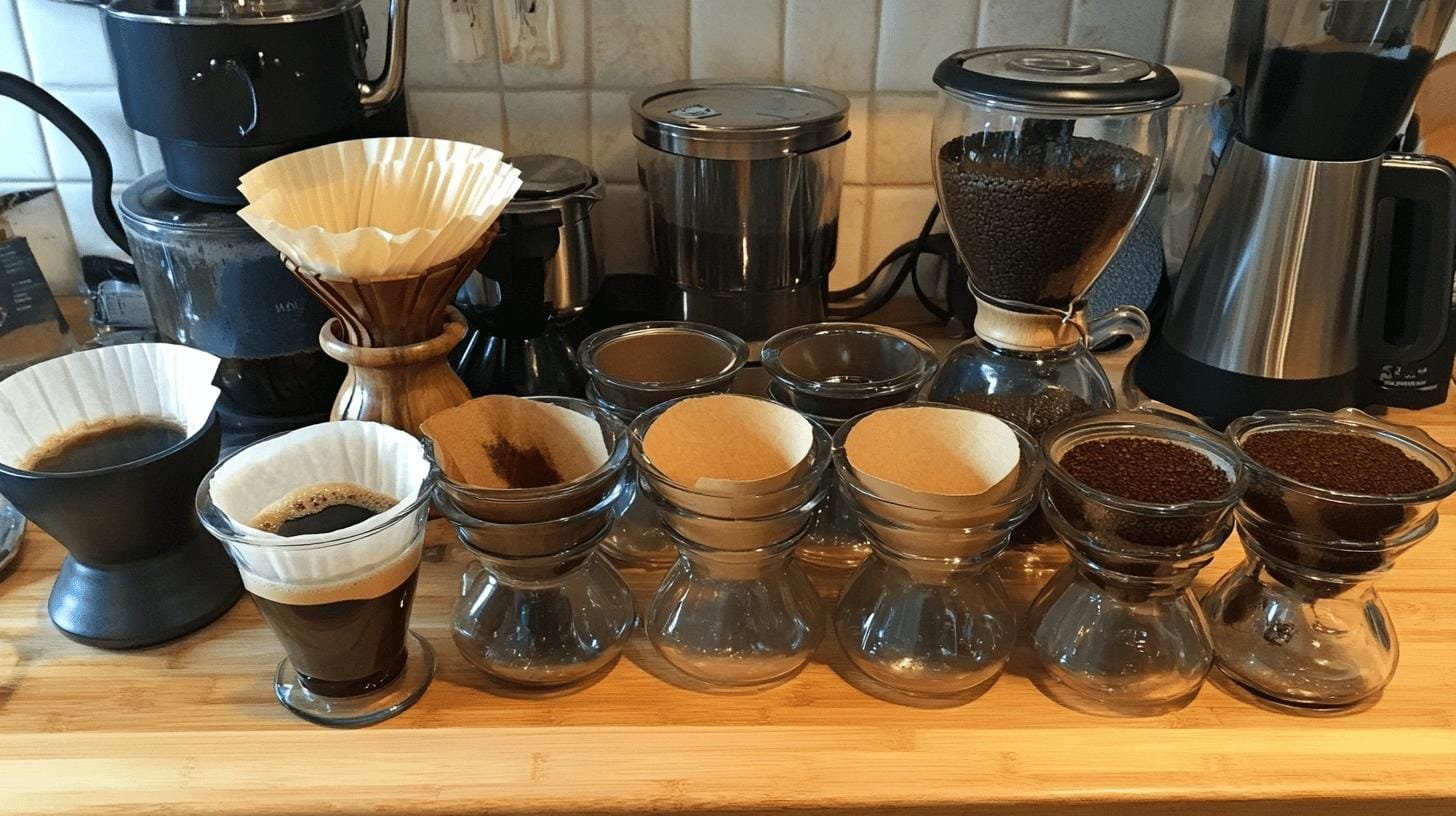
Artisanal Rituals for a Memorable Customer Experience
How can brands create a more balanced and memorable customer experience by blending artisanal product quality with thoughtful everyday rituals that keep people coming back?

Could a simple paper filter be the key to managing cholesterol levels for coffee lovers? Research suggests a shocking connection between the type of filter used in coffee brewing and cholesterol impact. Paper filters hold a secret advantage by trapping cafestol, a cholesterol-raising compound naturally found in coffee.
While this might sound like alchemy to some, the science is clear: choosing paper filtered coffee over unfiltered varieties could mean a healthier heart. Dive into the specifics and discover how this simple switch might be your best ally in cholesterol management.
Coffee is a complex brew with compounds that can influence cholesterol levels. An important one is cafestol, a diterpene in coffee oils. Cafestol can raise LDL cholesterol, often called “bad” cholesterol. Its presence is higher in unfiltered coffee methods like French press, as the grounds are in contact with water. This allows cafestol to seep into your cup.
Paper filters are essential in reducing cafestol levels in coffee. They trap the coffee oils, preventing them from entering the drink. Consequently, paper filtered coffee poses a lower risk of increasing cholesterol compared to unfiltered methods.
For those worried about cholesterol, experts suggest choosing paper filtered coffee. Health professionals advise that regularly drinking coffee made with these filters supports a cholesterol-friendly lifestyle. By reducing cholesterol-raising compounds, coffee lovers can enjoy their brew without sacrificing health. Understanding the filter’s impact on cholesterol levels empowers informed choices that align with health goals.

Different coffee brewing methods provide unique flavors and textures, but they also vary in their effect on cholesterol levels. The main factor here is diterpenes, like cafestol, that can raise cholesterol. Brewing ranges from paper filters, which remove these compounds, to metal, cloth filters, and unfiltered methods like French press and espresso. Each method has its pros and cons, particularly for cholesterol management.
Metal filters give a rich, full-bodied coffee by letting more oils and fine particles pass through. This boosts flavor, but at a cholesterol cost. Metal filters aren’t as effective as paper filters in removing diterpenes like cafestol. This means coffee brewed this way might retain more cholesterol-raising compounds, potentially risking cholesterol health.
Cloth filters balance flavor and health impact. Made from materials like cotton, they remove some diterpenes, including cafestol, while allowing more coffee oils than paper filters. This method offers a middle ground between metal-filtered coffee’s flavor and paper-filter benefits. Though better than metal filters, cloth filters don’t minimize cholesterol risks as well as paper filters.
Unfiltered methods like French press and espresso are known for bold flavors due to high coffee oils in the brew. These methods have higher cafestol content, as they lack a filtering medium. Thus, unfiltered coffee can increase cholesterol levels, making it less suitable for those with cholesterol concerns. The lack of filtering means more compounds remain, urging caution for health-conscious individuals.
Cafestol affects cholesterol and is linked to LDL cholesterol increase, heightening heart disease risks. Regular unfiltered coffee consumption can lead to elevated cholesterol, raising heart concerns. Studies show cafestol impacts lipid profiles, warranting caution for those with cholesterol sensitivities.
Paper filters effectively reduce cafestol in coffee, trapping coffee oils. This results in a brew low in cafestol, cutting health risks linked to high cholesterol. Paper filters align with health advice to lower cholesterol-raising compound intake, making them ideal for safe coffee consumption.

Choosing the right filter and brewing method is crucial for cholesterol-conscious people. Paper filters are highly recommended for reducing cafestol, known to raise LDL cholesterol. This process not only makes a cleaner cup but also lowers health risks. Understanding brewing methods helps coffee drinkers make healthier choices.
Moderation and individual responses to coffee matter. While paper filtered coffee is usually safer for cholesterol, personal tolerance varies. Some may not face cholesterol issues even with high coffee intake. Therefore, monitoring personal response is crucial. Balancing enjoyment with health ensures coffee remains part of a happy lifestyle.
Home-roasted beans paired with paper filters offer advantages for cholesterol-conscious individuals. Home roasting offers precise control, allowing personal flavor customization while avoiding extra oils in commercial brands. Adjusting roast levels enhances flavor without added residues. Paper filters ensure a clean, oil-free cup, reducing diterpenes like cafestol. This combination supports healthier lipid management and personal taste preferences.
Navigating the complexities of paper-filtered coffee and cholesterol reveals a clearer path to heart-conscious choices.
Understanding how paper filters effectively reduce cafestol, a compound known to elevate cholesterol, emphasizes their importance in coffee brewing for health benefits.
By comparing paper filters with metal, cloth, and unfiltered methods, the advantages of paper filtering become evident.
With reduced cholesterol impact, paper-filtered coffee emerges as a safer choice for those managing their cholesterol levels.
Adopting these insights and incorporating tips for healthy preparation can cultivate a balance of flavor and well-being.
Seizing control over coffee consumption contributes to a healthier lifestyle, ensuring each cup favors both taste and heart health.
Using paper coffee filters can significantly reduce the presence of cafestol, a compound known to raise cholesterol levels in coffee drinkers.
Paper-filtered coffee is generally considered healthier than unfiltered methods. The filters effectively remove diterpenes, reducing potential cholesterol-raising effects.
Yes, paper filters can effectively remove most of the cafestol present in coffee, lowering the risk of elevating cholesterol levels.
Coffee brewed with paper filters is typically better for maintaining healthy cholesterol levels due to its reduced cafestol content.
Coffee can impact cholesterol test results due to its cafestol content. Using paper filters can reduce this effect, making it a beneficial choice for those monitoring cholesterol levels.

How can brands create a more balanced and memorable customer experience by blending artisanal product quality with thoughtful everyday rituals that keep people coming back?

Independent coffee shops have always been about more than caffeine—they’re hubs of creativity, connection, and care. As café culture continues to evolve, new trends are

Introduction Independent cafes win when they feel like the neighborhood’s living room and operate with the discipline of a great kitchen. Below is a quick

Discover how top specialty coffee brands create lasting loyalty through storytelling, sourcing, and community connection. Real tips from 6 industry experts.

Discover the ultimate showdown between two beloved coffee brewing methods: the French press and Chemex. Explore how each technique caters to distinct palates, with the French press delivering bold flavors and the Chemex presenting a bright, clean taste.

Unlock the secrets to brewing the perfect cup of coffee with our comprehensive guide on using a coffee scale. Discover how precise measurements enhance flavor and consistency while eliminating bitterness.

Discover how water temperature plays a vital role in brewing the perfect cup of coffee. This article delves into the ideal temperature range of 195°F to 205°F for optimal flavor extraction, enhancing the enjoyment of high-quality beans.

Discover the world of curated specialty coffee bundles, perfect for enthusiasts seeking quality and craftsmanship. This article explores the benefits of ethically sourced, small-batch beans from brands like Equipoise Coffee, offering diverse flavor profiles that elevate your brewing experience.

Discover the art of manual brewing to elevate your coffee experience! This article explores various techniques like pour-over, French press, and AeroPress, revealing how they enhance flavor and your connection to every cup.